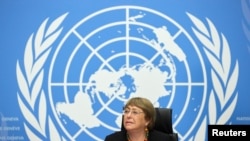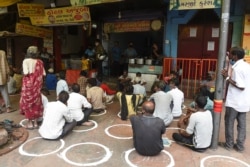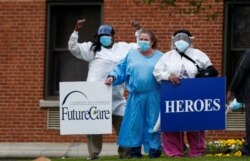The U.N. high commissioner for human rights has issued a call to action for international Human Rights Day to build back in a more sustainable and just way after the COVID-19 pandemic.
“The pandemic has left us exposed, vulnerable, and weakened,” Michelle Bachelet said at a news conference in Geneva on Wednesday ahead of Thursday’s observance. “Yet, in its devastation, it has also provided clear insights on how we can turn disaster into an opportunity to reset our priorities and improve our prospects for a better future.”
There have been over 68 million confirmed cases globally of COVID-19, the disease caused by the coronavirus, and more than 1.5 million deaths, according to Johns Hopkins University, which tracks the data.
“The medical vaccines that are being developed will hopefully eventually deliver us from COVID-19, albeit not for many months yet,” Bachelet said. “But they will not prevent or cure the socio-economic ravages that have resulted from the pandemic and aided its spread.”
She said the vaccine for hunger, poverty, inequality and many other global ills is at its core, respect for human rights.
Pandemic shocks
Millions of people worldwide have lost their jobs and livelihoods. Extreme poverty is on the rise, and the United Nations says 235 million people are in need of humanitarian support.
Instability has grown in some countries, while in others, authoritarian leaders have used lockdowns to limit freedoms and protests.
More than a billion children have missed out on in person attendance at school this year, and the switch to online education has further highlighted the digital divide.
Now there are concerns that developing countries will be at the back of the queue behind wealthy nations to get access to life-saving COVID-19 vaccines.
"The COVID-19 pandemic has uncovered deep inequalities when it comes to the availability of treatments and vaccines,” Human Rights Watch U.N. Director Lou Charbonneau told VOA. “First there was the hoarding of PPE (personal protection equipment). Now rich governments are in a mad rush to hoard vaccines, leaving poor countries to fend for themselves.”
Declaration turns 72
The U.N. is hosting events in several countries to mark the anniversary of the 1948 proclamation of the Universal Declaration of Human Rights, including photo exhibitions, online concerts and a celebration of COVID-19 frontline heroes.
The declaration lays out 30 basic rights and fundamental freedoms to be universally protected. First and foremost, all humans are “born free and equal in dignity and rights.” They should have freedom of thought, opinion, religious belief and peaceful assembly, and the right to education and a decent standard of living. The declaration also includes prohibitions on discrimination, slavery and torture.
“Realizing the goals of that declaration means protecting all human rights, not cherry-picking the ones you like and ignoring those some governments consider inconvenient,” HRW’s Charbonneau said of shortcomings in the declaration’s implementation.
“Rights-respecting governments should resist efforts to get rid of protections for women and girls, LGBTI people or other vulnerable groups in the name of returning to some kind of twisted interpretation of the Universal Declaration,” he added.
The Declaration of Human Rights is one of the most translated documents in the world – it is available in more than 500 languages, including most recently Rohingya, Afar and Crimean Tatar.






